Can we consult the white housewives of the 1950s before we hold them up as the gold standard of satisfied women?
If we don't know our homemaking history, we are destined to repeat it.
Quick announcement: Next Sunday, July 27 will be our zoom discussion of Ruth Whippman’s BoyMom at 5:00pm PT for paid subscribers. If you’d like to join us- please do! I’m sure it will be a great discussion. The link to register is underneath the paywall at the bottom of this article. Once you register a zoom link will be emailed to you. See you next week! Can’t wait to discuss!
Last year, Kansas City Chiefs kicker, Harrison Butker delivered a commencement speech at Benedictine College where he told the female graduates, “I want to speak directly to you briefly because I think it is you, the women, who have had the most diabolical lies told to you.”
What were those diabolical lies? According to Harrison, that careers bring women happiness and fulfillment. He waxed emotional counseling women to lean into their true vocation and embrace the most important title of all: homemaker. Then their lives may truly begin.
Harrison’s talk is chock full of wistful yearnings for yesteryear when we “embraced tradition” in everything from traditional Catholic Mass to traditional methods of birth control (read: no methods of birth control). But mostly he waxes poetic about returning to a time when men were happy being masculine and women were happy being feminine.
It’s not just Harrison trumpeting a call for “traditional” women. The tradwife movement online is a wildly popular, lucrative movement of women cosplaying 50s housewives baking in dresses and pearls.
Ah the 1950s, that unblemished paradise of familial bliss.
In 9th grade we had to write an essay describing which time in history we would choose to live in if we could. Guess what I picked?
The 1950s.
Don’t cancel me. I just wanted to live out matronly happiness baking pies and vacuuming in a time when women were clear that was the key to a meaningful life.
Interesting how we feel confident speaking for the white women of the 50s, awarding them the pinnacle of feminine bliss without ever checking in with the women themselves.
The thought never occurred to me as a virginal 9th grader, but let’s check in with them, shall we?
The Problem With No Name
In the late 1950s Betty Friedan was asked to survey her fellow graduates of Smith College class of 1942 for an upcoming reunion.
What she found both surprised and comforted her- her classmates, who were mostly working white women during World War II turned 1950s housewives were just as unsatisfied and unfulfilled as she was.
They just couldn’t quite put their finger on why.
Betty, a freelance writer, was intrigued and wanted to gather more information. She spent the next five years traveling across the country interviewing hundreds of *women about their lives and their satisfaction in them (*straight white middle-class women exclusively).
What she found was this “problem with no name” of secretly depressed malaised housewives wasn’t just a plague of her Smith classmates, it was a widespread epidemic.
Initially she intended to write an article with her research, but when no magazines would take the story, Friedan decided to turn it into a book, The Feminine Mystique.
Much to the publisher’s chagrin, the book was published in the middle of a months-long newspaper strike, which took out their main source of advertising.
Despite this, the book spread like wildfire, exceeding all expectations. They initially printed only 3000 copies of the book, which proved grossly inadequate. With *homemakers across the country devouring and sharing the book, the original paperback alone ended up selling over one million copies (*straight white middle-class homemakers).
Friedan was flooded with letters from housewives relating to the book: “I feel, today, as though I had been filled with helium and turned loose!” “Like light bulbs going off again and again.” “I finally understood what I was feeling and felt validated!!”1
In 2012, author Stephanie Coontz interviewed women fifty years later, who reflected back on just how life changing reading Friedan’s book was for them. They recall,
“I finally realized I wasn’t crazy.” “It literally changed (and perhaps saved) my life.” “Something clicked.”2
This was wild to read because I had a similar experience reading it in 2020 (Mormon women are typically 50+ years behind the times, so this tracks). My heart hit my stomach from the first sentence:
Being raised Mormon, the idea that a woman’s divine purpose on earth is to be a wife and mother wasn’t just sold as the best route to happiness, but as irrefutable fact.
“Before the world was created, the pattern and role of women were prescribed. You were elected by God to be wives and mothers. Exaltation is predicated on faithfulness to that calling…Beguiling voices spread their discontent by the propaganda that there are more exciting and self-fulfilling roles for women than homemaking… It is a fundamental truth that the responsibilities of motherhood cannot be successfully delegated. No, not to day-care centers, not to schools, not to nurseries, not to babysitters.”3
Is this a quote from Buttkiss? No, it’s from Mormon prophet Ezra Benson, who was the prophet when I was growing up. I’m sure him and Bupkins would be good friends though.
It was a little jarring to see the nation-wide outrage to a man telling women their role is to stay at home, when men unapologetically told me that for 35 years of my life. If Butler read his talk out at a Mormon church, there would be no uproar, just a normal Sunday.
I never ever questioned my divine role of homemaker while I was in the church. What I did notice though, was a lot of privately depressed women blaming their depression on themselves whilst proclaiming their immense gratitude to be a wife and a mother. Myself included.
Let’s check in with the happy homemakers of the 1950s
Proponents of “going back to how things were” when gender roles were more uncomplicated, act as though women did nothing beside staying at home to raise the children until the mad women’s libbers came along and ruined everything by allowing women to work outside the home.
But that is not true at all. Women have always, always worked. The 1950s where women were isolated in suburban homes raising kids were a historical anomaly.
And that little historical experiment didn’t work out well for women.
A 1948 British study by Dr. Stella Instone found that out of 61 housewives, 45 experienced significant anxiety.
In 1949, Dagmar Wilson reported that 79% of 194 housewives exhibited symptoms like tiredness, anxiety, and depression.
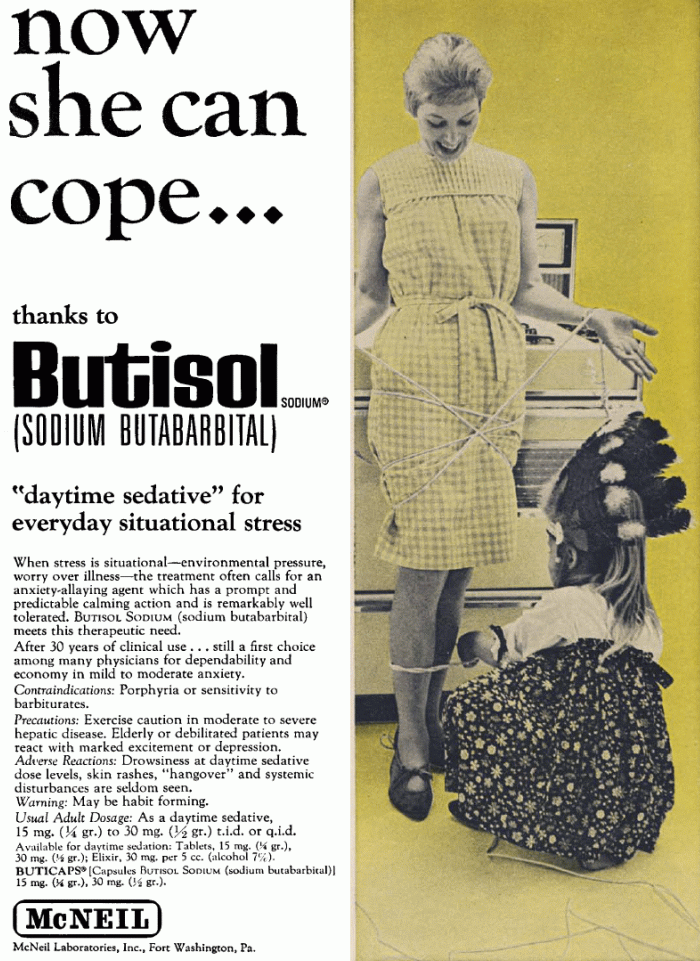
In the 50s, the term “mother’s little helpers” referred to the widespread use of tranquilizers like Valium and stimulants like amphetamines among housewives to cope with daily pressures. Doctors would prescribe amphetamines for the day, and barbiturates benzodiazepines to wind down at night.
During the 1950s, U.S. manufacturers produced enough amphetamines annually to supply every American with 50 doses per year.
By the late 1960s, 85% of amphetamine prescriptions were written for women aged 36-45.
Relying on meth to get through the day is not a great sign of thriving.
And while we’re sharing vintage ads, this ad for men’s pants sums up the housewife’s plight for the visual learners:
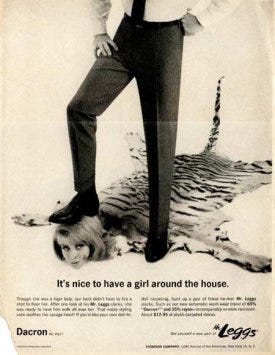
After no fault divorce laws were legalized in 1970, female suicide rates dropped 20%.
Let me just say that one more time.
After no fault divorce laws were legalized in 1970, female suicide rates dropped 20%.
Late night homemaker confessions: “It’s not fair” whispered in the dark
In her book, Housewife to Heretic published in 1981, Sonja Johnson’s mother, an actual 1950s housewife, plays the role of defender of the patriarchy to her daughter. Even when the Mormon leaders unfairly drag Sonja’s name through the mud, her mom keeps defending the men. A true lover of her divine role as a wife and mother.
But one late night in Sonja’s kitchen, her mom began reflecting on her life as a child:
"She remembered what was required of her as a young girl. After a bonebreaking day in the fields, she was to drag her exhausted body and her screaming muscles about the kitchen to help the women with the supper and the washing up while the men were allowed-even expected and encouraged- to rest. And despite going to bed two hours later than the men to tidy up and wash the dishes, she had to arise earlier than they did the next morning to begin it all over again. There was no rest for the women- only endless drudgery, until the children were reared, and then death."
"She idolized her father, but I asked her what she thought of her near-perfect father for behaving this way. Her eyes filled with tears and she whispered, 'It wasn't fair.'"4
A whispered "It's not fair" in a moment of vulnerability from a woman who has devoted her life to homemaking… I've heard that before.
One Sunday about eight years ago, I was teaching a Sunday School class on Jonah. We were talking about the part of the story where instead of rejoicing that the city he preached to accepted the gospel in the end, Jonas was bitter and mad that they rejected him.
In a rare moment of present-tense vulnerability,5 a dear friend said "I struggle with this too. My husband was a wonderful provider for our five kids, but he just wasn't around. He was busy in med school, residency, crazy physician schedule. But now, he gets to be the grandkids' favorite. And I'm still the disciplinarian who puts them to bed and makes them eat carrots instead of candy."
Normally this woman, like Sonja Johnson’s mother is a loyal glorifier of the homemaking life.
But later that week on a walk just her and I, she brought up my Sunday School lesson again. She admitted she was struggling that there is simply no punishment, no consequence whatsoever for her husband to have been entirely absent from her kids' childhoods. No reward for her decades of invisible labor. She thought she would at least be rewarded by closer relationships with her kids and grandkids, but it hasn't worked out that way. What did she have to show for her 30+ years of dedication and sacrifice?
"It's not fair" she whispered.
…………………..
In the heyday of my own tradwifery, me and some friends had a weekly sewing group. As you do when your life is cosplaying the 1950s. The ladies that attended were all fellow happy happy Mormon homemakers. But once 10:00pm, 11:00pm would roll around honest whispers would surface.
“My husband has taken sick days the last two days. He hasn’t even gotten out of bed. But when I was puking last week, I still had to get up with my baby, cook for my toddler and take care of them all day. There are no sick days for moms.”
Confessions were always quickly followed by "Oh but my husband is one of the good ones! I'm so lucky! He's such a great dad! I'm so lucky!"
And this is what is happening to those privileged enough to stay at home
Bear in mind, this entire essay we’ve been focused solely on middle-class white women, which is hardly the entire picture.
Harrison has been widely critiqued for holding up a standard that simply isn’t possible for most women. Most women in this country can not afford to not work. He completely discounts single mothers, the many who have no choice but to work, and how different the story is for women of color, those who can’t have children. The list goes on.
Alyssa Griffin of The View said it well: “If you marry an NFL player who wins the Superbowl, you too might be able to be a homemaker in this economy!”
Betty Friedan was widely and accurately critiqued for this same narrow view. She also left out single mothers, lower-class working mothers, queer women and women of color from her research.
The stay at home mom is a uniquely white invention- “traditional womanhood” looked very different for Indigenous, Latino, African and other non-white cultures.
It’s telling then, that even the ones who arguably have the best shot at homemaker happiness—the middle-to-upper-class white women who want to stay at home—even among them there is a rampant undercurrent of depression, isolation and emptiness.
Not to mention the insane vulnerable position this puts women in if anything happens to her husband or her marriage. Counseling women to not pursue education or a career isn’t just unfair for the sake of her happiness, it’s unsafe. Life rarely goes as planned and when it doesn’t, the stay at home mom is left often without a degree, no work experience, nothing on her resume, and no way to provide for herself or her children.
The stories I could tell of women I know stuck in shitty marriages because of this exact situation could fill a whole book.
“CHOSEN motherhood is the real liberation”
Now does staying at home with her kids destine a woman to a life of depression and misery? Certainly not.
Millions of women find genuine joy and fulfillment staying home with their kids.
Another quote from the Feminine Mystique brings it home:
Key word: CHOICE.
Sonja Johnson makes the point in her book that assuming ALL women are well-suited to being homemakers is like assuming ALL men are well-suited to be farmers.
We wouldn’t say that of men because it has always been expected for men to be diverse full humans with a wide range of interests. They get to be writers or accountants or doctors or farmers. We turn women into uniform monoliths when we believe homemaking is every woman’s true vocation.
Only 2% of men choose to become farmers. What if only 2% of women are well suited for homemaking? What if only 2% would choose the chauffeuring, diaper-changing, and sandwich-making if they were all given a morally neutral choice between homemaking and any other pursuit?
Perhaps the one-size-fits-all approach of expecting women to be all the same, all thriving in the same isolated home environment added to just how depressed so many houswives of the 50s were. And explains why Friedan’s book was so revolutionary.
Those women who were smiling in the light, but whispering“it’s not fair” in the dark.
The lack of infrastructure and support for mothers in America make homemaking extremely difficult even for the ones well suited for it.
If we don’t know our homemaking history, we will repeat it.
I’ll let the daughter of a 1950s housewife, Sonja Johnson sum things up for us:
"Why? I asked myself for days after our night in the kitchen. Why was my mother born with superior intelligence and extraordinary gifts as an organizer, an administrator, a financier and an artist if she was not meant by her creator to use those gifts fully?
And why has she turned into a timid, frustrated woman?
Because she was allowed... only her family as an outlet.
The family is a very narrow sphere. It is cruel to bottle up immense talents there. It isn't fair Mama, what happened to you. Listen to those echoes: not fair, not fair--not kind, not decent, not loving, not fair. Dad first saw her galloping bareback over the Idaho plains in men's overalls.
Where is that girl who galloped with her hair flying?
That she is lost, that her gifts were ignored and spurned and pounded out of her is a cause for grief to those of us who know and love her. But multiply her life by the billions and try to keep from howling with rage and despair at the impoverishment that women's bondage has wreaked upon the human family."
**This article was originally published May 19, 2024
Come chat with us next Sunday, July 27 at 5:00pm PT where we will discuss BoyMom together!
The registration link is below this pay wall. Update your subscription to register and join the discussion. Hope to see you there!
Register here: https://calendly.com/celestemdavis/matriarchal-blessing-book-club-boymom
Once you register, you will be emailed the zoom link. Excited to see you there and discuss the book!
Source: The New Yorker
Source: The New Yorker
Source: The Honored Place of Woman
As is common of these honest confessions- it was later backtracked. Here’s what Sonja said later, “Since that night she has regained some of her defenses against recognizing the blatant injustices of such a system, so when I've reminded her of what she told me that night, she's insisted that she hadn't remembered correctly, and that her father often had helped with the dishes and had not gone to bed leaving the womenfolk still hard at work. But I remember that night in my kitchen and the terrible things that were dawning upon both of us...... No, it wasn't fair Mama. You were right it wasn't fair."
as opposed to the much more common past tense- I USED to struggle with this, but now I've passed the test, learned the lesson and I'm A-OK!





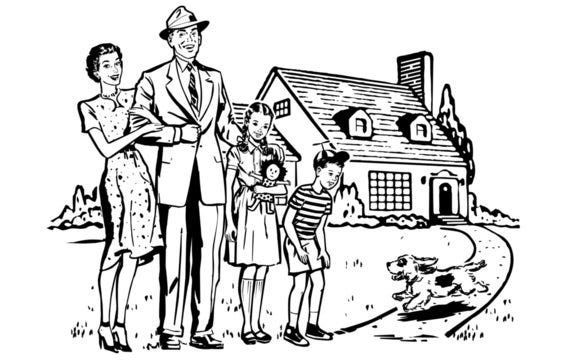

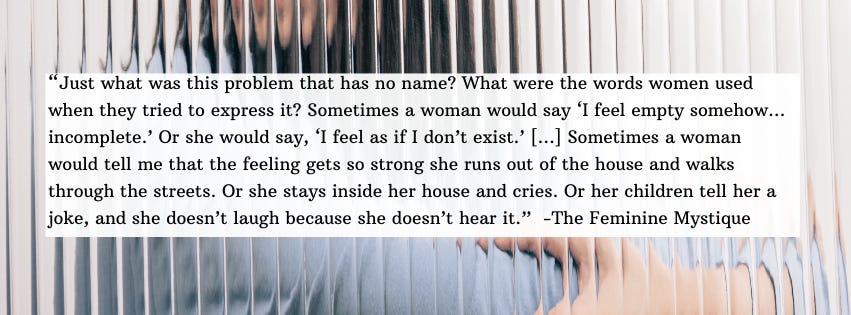

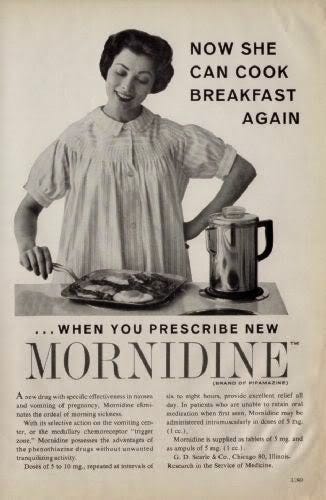
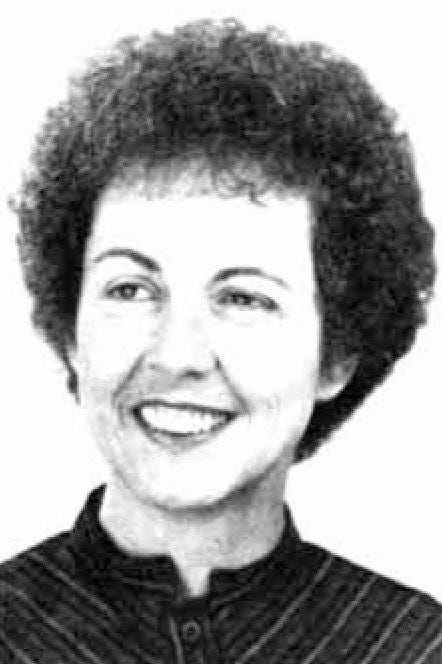


My mother was born in 1914, my father in 1907. They were thoroughly engulfed in the sex/gender roles they were handed. Ours was a picture-perfect 1950's household...on the surface. I was born late into this family, 1954, and I did not like what I was being handed at all. Enough that I ran away from home when I was 17.
My mother had been a WPA artist with a degree of national recognition and a talented pianist. She was of course expected to give all that up to be "moms." Many years later when she was in a nursing home and the topic of my running away came up, she said this:
"Why didn't you take me with you?"
plenty of those home makers in nice dresses were rich and had Black women to do all the real work including wiping snotty little beaks or runny arses